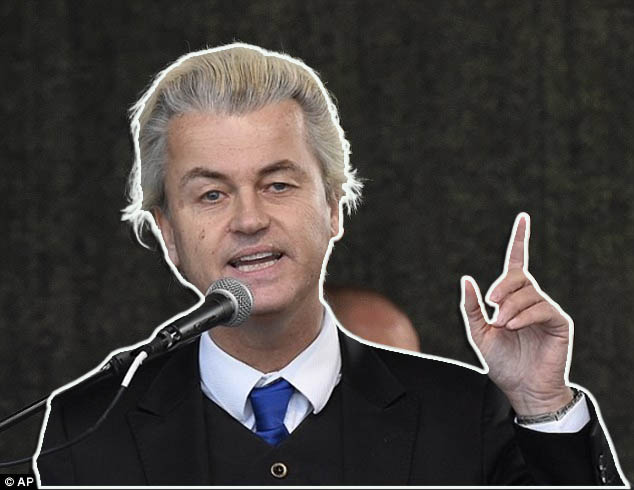
- Wilders’ path to becoming the Prime Minister is contingent upon his ability to persuade potential partners from other parties to collaborate with him, presenting a nuanced challenge in Dutch politics.
- Wilders’ political identity is inseparable from his inflammatory language, notably being critical of Islam and describing it as a “totalitarian ideology” not aligned with Dutch ethos.
- The international community is closely watching the developments as the Dutch election aligns with a broader trend of far-right parties gaining traction in Europe.
Geert Wilders, distinguished by his peroxide blond hair and impassioned rhetoric, has etched his presence as one of the Netherlands’ most recognizable lawmakers, both domestically and internationally. Often dubbed the Dutch Donald Trump, Wilders is renowned for his strident stance against immigration, the European Union and concerns over radical Islam
Following an unexpected triumph in the recent general election, Wilders finds himself in a pole position to potentially assume the role of the country’s next prime minister. However, the path to this position is contingent upon his ability to persuade potential coalition partners from other parties to collaborate with him, presenting a nuanced challenge in Dutch politics.
Wilders’ political journey commenced in 1998 as a member of the centrist VVD party, where he mentored a young Mark Rutte. In 2006, he established his political entity, the Party for Freedom, thereby becoming the longest-serving lawmaker in the Dutch parliament.
Controversy and Provocative Rhetoric
Wilders’ political identity is inseparable from his inflammatory language, notably describing Islam as a “totalitarian ideology” and labelling Moroccans as “scum.” This aversion to Islam was further fueled by the assassination of the anti-Islam filmmaker Theo van Gogh in 2004 and his experiences in an Israeli kibbutz. Notably, he has faced legal repercussions, including a conviction for insulting a group based on their background.
His concerns over Islam have made Wilders a target for extremists, necessitating continuous 24/7 protection and a life spent moving between safe houses over the past two decades.
Political Agenda and Policies
Central to Wilders’ recent campaign was his pledge to halt the “asylum tsunami,” attributing it to various societal issues, including housing shortages and high health costs. His proposals include ending asylum for refugees, restricting the free movement of labour within the EU, revoking temporary asylum permits for Syrians, and deporting criminals by stripping them of Dutch nationality.
In the realm of climate policy, Wilders is critical of climate scientists, advocating for the continued operation of coal and gas power stations while opposing the construction of solar parks and wind turbines. He calls for the Netherlands to withdraw from the U.N.’s Paris climate agreement, emphasizing climate adaptation measures such as reinforcing dykes.
As a fervent Euroskeptic, Wilders supports a “Nexit” referendum on leaving the EU and seeks opt-outs from EU regulations on asylum and migration.
International Relations and Global Perspectives
The repercussions of Wilders’ political ascent extend beyond Dutch borders. The international community is closely watching as the Dutch election aligns with a broader trend of far-right parties gaining traction in Europe, echoed by congratulatory messages from political counterparts like Marine Le Pen in France and Hungary’s Viktor Orbán.
Wilders’ stance on foreign policy has been marked by his praise for Russian President Vladimir Putin, although recent events, notably Russia’s invasion of Ukraine, prompted a nuanced shift in his position. He distanced himself somewhat from the Kremlin, characterizing the invasion as a mistake.
On matters related to the Middle East, Wilders staunchly supports Israel, advocating for the relocation of the Netherlands’ embassy to Jerusalem while expressing scepticism toward the Palestinian Authority.
The Path to Prime Minister
Despite securing an impressive 25 per cent of the vote, Wilders faces the intricate task of forming a coalition government, necessitated by the fragmented nature of the Dutch electoral system. The reluctance of mainstream parties to align with far-right ideologies poses a formidable challenge, as they have historically kept Wilders out of government for over a decade.
In his victory speech, Wilders extended an invitation to other parties for constructive engagement in coalition talks, hinting at a willingness to compromise on certain contentious issues. However, the intricacies of coalition negotiations in the Netherlands and the historical hesitancy of mainstream parties to collaborate with far-right elements will shape the trajectory of Wilders’ ambitions to assume the prime ministership.
As the enigmatic figure continues to shape Dutch politics, the ramifications of his ascent resonate on the global stage, influencing the dynamics of European politics and the broader discourse on populism, nationalism, and far-right ideologies.
(The author is a post-graduate student in International Relations at Kalinga University, Raipur. Views and opinions expressed are the author’s own)
Aayush Pal is a freelance writer on contemporary geopolitical developments. The views expressed in his work are entirely his own.
